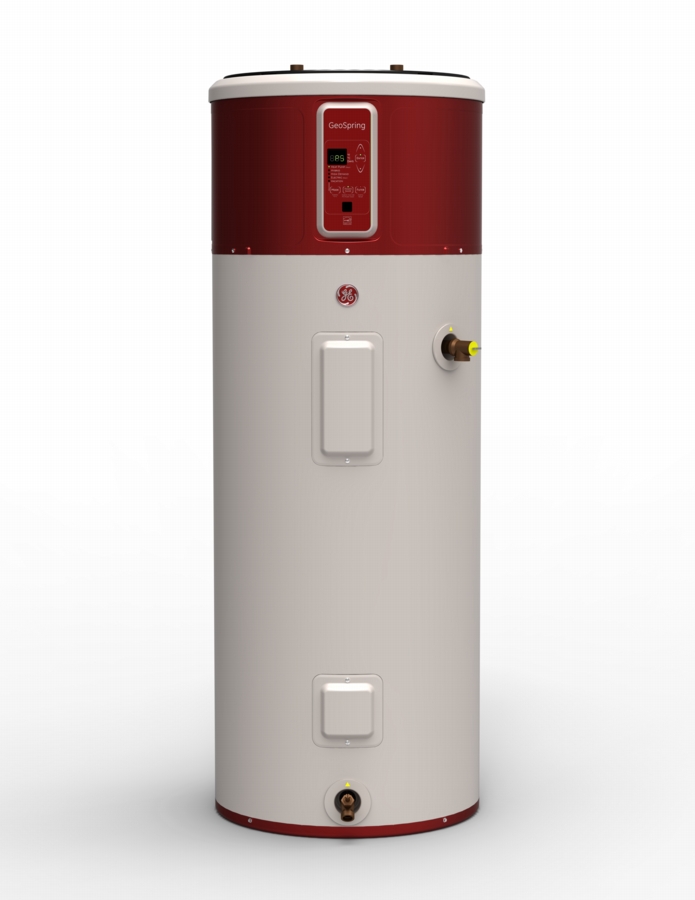
Image Credit: GE Appliances
Last week I wrote about “hybrid” water heaters, a relatively new type of water heater that includes features of both storage and tankless models. This week I’ll cover another type of water heater that is also (confusingly) referred to as “hybrid”: heat-pump water heaters. These produce over twice as much hot water for each unit of electricity consumed as any other type of electric water heater (storage or tankless).
You’re going to be hearing a lot about heat-pump water heaters over the next few years, because new federal regulations that take effect in 2015 will require heat pump functionality for larger electric water heaters — more on that below.
Why it’s worth considering water heating carefully
Before diving into heat-pump water heaters and what makes them tick, it’s worth spending a minute to say why I’ve focused so much attention on water heating in this blog recently. As a fraction of residential energy consumption, water heating has become more and more significant over the past several decades.
In 1978, water heating accounted for approximately 14% of a home’s average energy consumption, according to the U.S. Department of Energy, compared to 66% for space heating. By 2005, those percentages had shifted to 20% and 41%, respectively. I assume that this isn’t because our water heaters are using a lot more energy, but rather that our houses are better insulated and our heating systems more efficient.
MORE INFORMATION
GBA Encyclopedia: Water HeatingAll About Water HeatersGet Rid of Your Gas Water Heater!Heat-Pump Water HeatersHeat-Pump Water Heaters Come of AgeGetting Into Hot Water — Part 4Product Guide: Heat-Pump Water Heaters
In an ultra-efficient Passivhaus building (built to the German standard for low-energy homes that is gaining popularity in the U.S.), it’s not unusual for water heating to be the largest energy user in the house, and it can be as much as twice that of space heating.
Electric-resistance vs. heat-pump water heating
Up until recently, almost all electric water heaters relied on electric-resistance heat. Electric current flows through a special element with high electrical resistance, and the electricity is converted directly to heat. The conversion of electricity into heat is virtually 100% efficient — though heat loss from an electric storage-type water heater always results in an overall efficiency lower than 100%. (Note that if we’re looking at primary or source energy that the power plants use to produce the electricity, the efficiency is far lower.)
Heat-pump water heaters are very different. Electricity isn’t converted directly into heat; rather it is used to move heat from one place to another. This is counterintuitive, because the heat is moved from a colder place (the room air where the water heater is located) to a warmer place (the water in the storage tank).
This seemingly magic process happens because a specialized refrigerant fluid is alternately condensed and evaporated in a closed loop. This process relies on phase changes of the refrigerant that capture and release significant amounts of heat.
A detailed explanation of the refrigerant cycle is beyond the scope of this blog. Trust me that it works. (It’s the same basic principle used in your refrigerator, which extracts heat from inside that insulated box and dumps it into your kitchen.)
The net result is that for every one kilowatt-hour (kWh) of electricity consumed, two or more kWh of hot water are produced. The energy factor, which is often thought of as a measure of efficiency, is 2.0 to 2.5 for most heat-pump water heaters on the market, while a 100% efficient electric-resistance water heater would have an energy factor of just 1.0.
Growing interest in these water heaters
There are a few heat-pump water heaters that have been on the market for decades, but these never really reached the mainstream. All that has changed in the past few years, however, as the largest water heater manufacturers, including A.O. Smith, Rheem, and GE have all introduced heat-pump water heaters.
While standard electric water heaters have no moving parts, heat-pump water heaters have compressors (to compress the refrigerant vapor causing it to condense into liquid) and fans (to circulate room air across the heat exchanger so that heat can be extracted from it).
Noisier than other water heaters
Be aware that these mechanical components produce noise — often significantly louder than a refrigerator. Heat-pump water heaters I’ve examined have noise ratings from 55 to 65 decibels (dB), which is a large range of variability (65 dB is ten times as loud as 55 dB). Most refrigerators are 40-50 dB.
If you are particularly sensitive to noise and don’t have an acoustically isolated place to install it, the energy savings from a heat-pump water heater might not be worth it.
New water heater regs to require heat-pump water heaters
New federal regulations that are due to kick in on April 16, 2015, will require that electric water heaters larger than 55 gallons have energy factors close to 2.0. The exact energy factor required is based on a formula that factors in the storage volume, but for all sizes in this category the required EF is close to 2 — a performance level that can only be achieved with heat pump technology.
The energy factor requirements for smaller water heaters — up to 55 gallons in size — are also rising in April 2015, but will remain below 1.0 and will be achievable with a very well insulated electric-resistance water heater.
Heat-pump water heaters rob heat from the house
Because heat-pump water heaters extract heat from the air where they’re located, with most installations they increase heating loads somewhat. If you have an expensive fuel, such as baseboard-electric and are in a cold climate with a significant heating season, a heat-pump water heater may not make sense.
These water heaters can make a lot of sense when there is a lot of waste heat, such as in a basement where an oil or gas furnace or boiler is located.
Size matters
Heat-pump water heaters come in various sizes: from 40 to 80 gallons for products I know about. For most families, the larger sizes make sense, primarily because heat-pump water heaters heat the water quite slowly — often just eight gallons per hour.
Most heat-pump water heaters have different settings that regulate how readily the back-up electric-resistance elements will come on. With larger models, users can operate them on the heat-pump-only mode (the most economic) more of the time. The first-hour rating will give you a sense of recovery time, but which setting the water heater is on makes a big difference.
My next water heater will likely be a heat-pump model
I’m pretty sure we’ll install a heat-pump water heater in the house we’re currently renovating. Given what’s on the market today, I will probably select the GE GeoSpring water heater, a 50-gallon model that’s 10 dB quieter and half the cost of the German-made efficiency leader, Stiebel Eltron. I’ll also look at the Rheem Hybrid Electric and the A.O. Smith Voltex, which have the same energy factor (2.4) as the GeoSpring — though noise will be the biggest determinant. The GeoSpring is the only heat-pump water heater that’s made in America.
At an electricity cost of 15¢/kWh, a heat-pump water heater will be significantly cheaper to operate than the highest-efficiency, condensing propane water heater (we don’t have natural gas in southern Vermont) — even if propane were to drop to $2/gallon (far below its current price). Where natural gas is available — and assuming the price of natural gas remains so low — heat-pump water heaters will have trouble competing on economic grounds.
A big attraction to me of heat-pump water heaters is that they can be powered using a photovoltaic (solar electric) system. Our new place will be net-zero-energy and we hope to entirely avoid fossil fuels in the house.
Be aware that heat-pump water heaters aren’t cheap. That GE GeoSpring I mentioned above lists for about $1,200, plus installation, and the Stiebel Eltron model costs about $2,500. Unlike electric-resistance water heaters, heat-pump models require condensate drains, which can add cost. By comparison, a standard electric or gas storage water heater can cost as little as a few hundred dollars.
Alex is founder of BuildingGreen, Inc. and executive editor of Environmental Building News. He also recently created the Resilient Design Institute. To keep up with Alex’s latest articles and musings, you can sign up for his Twitter feed.
Weekly Newsletter
Get building science and energy efficiency advice, plus special offers, in your inbox.





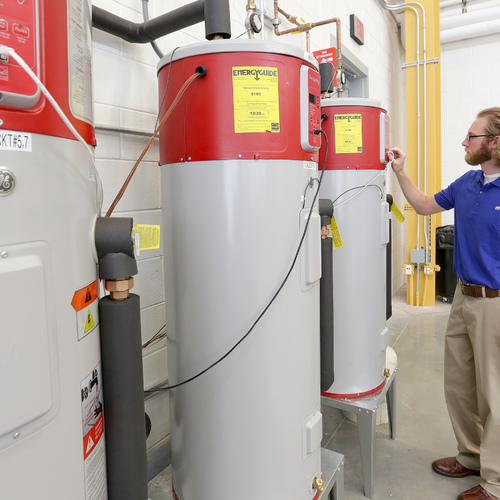
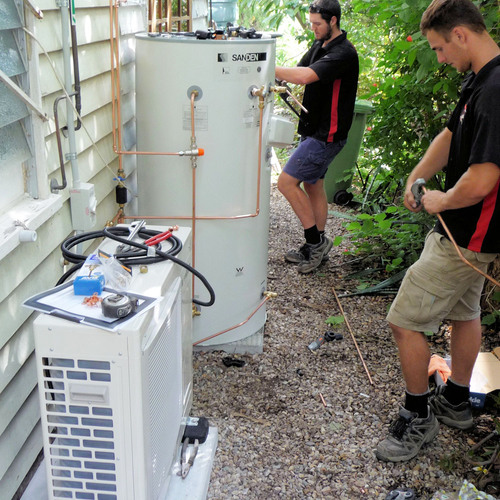
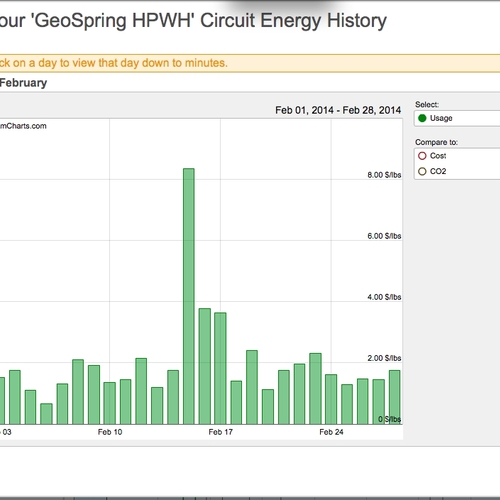
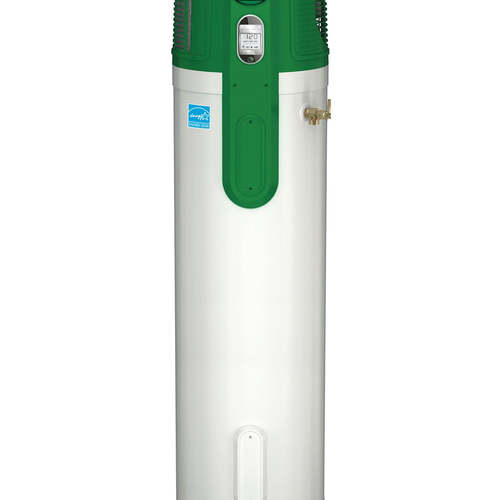
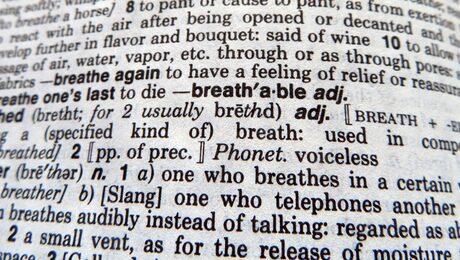
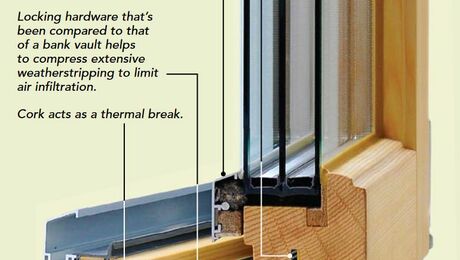
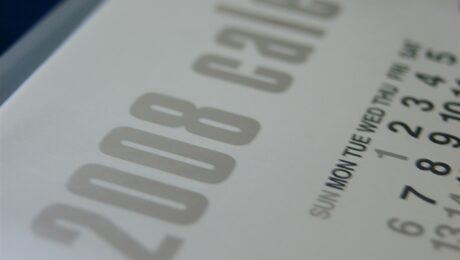
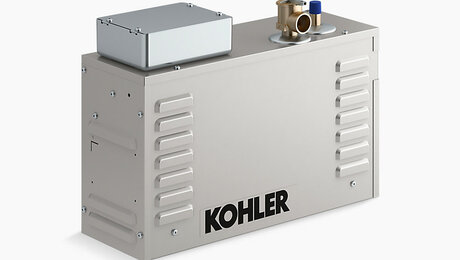
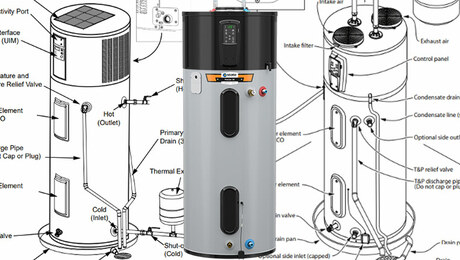
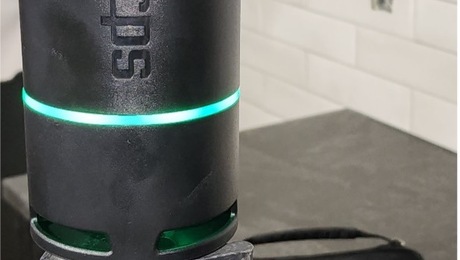
28 Comments
A correction and a note
The Rheem unit only has an EF of 2.0.
While I haven't seen the new GE unit in action, yet, I have the older model installed in my house. I think it was rated at about 55dB. It's loud. The only units I've seen/heard in action that have, in my opinion, an acceptable noise level for installation in anything but a basement are the units from AirGenerate (rated at 2.4EF and 48dB) - http://www.airgenerate.com/products/hybrid
Our experience
We installed one of these over at the Arlington Passivhaus
http://www.statewaterheaters.com/lit/spec/res-elec/SRXSS00109.pdf
At 80 gallons, and 81 inches, it is a giant. It is rated at 2.4EF not sure what the dB is but it is quite noisy when the compressor is on. The amount of condensate is also more than what we expected (maybe because it is in a brand new basement with the concrete slab still drying out). Conceptually, I like it, the efficiency, air conditioner and dehumidification are all great. But the noise is a big concern. I think people might end up just using it under electric mode because of that. I guess the walls can get more noise insulation to prevent that.
Another issue is the location needs to be in a relatively large open space. This one calls for 750 cubic feet. Not really suitable for small homes.
Typical government "one size fits all mentality"
I started pouring through that lengthy document (126 pp), looking for some discussion of situations where a heat pump water heater doesn't make sense, but gave up part way through, due to its length and boring nature. It would be a shame if something that does make sense in a good part of the country is forced on everyone, even where it makes little sense. My guess is that in some areas people would just install parallel regular 30 or 40 gallon water heaters to provide capacity.
another thought
One more thought on this. One of the criticisms of heat pump water heaters is they do add to heating loads in the winter. So, a lot of people simply turn the compressor off in the winter.
In most passivhaus projects the clothes dryer does not have an exhaust vent. They usually have a condensing dryer, this eliminates another penetration but more importantly, that heat produced by the dryer is used to heat the house in the winter. In summer, this arrangement causes added cooling load.
I think it might be beneficial to place the heat pump water heater in the same space as the condensing dryer to take advantage of that heat. This might help "balance" out that added loads each of these machines produce.
Reply to Roger Lin
Thinking along those same lines, you could place the heat pump WH behind the fridge, which is more consistently throwing off heat. Requires some careful floor plan arrangement, and the noise is certainly still an issue in such a central part of the home.
climate
As some of you have suggested, climate makes a big difference. I'm installing one in a remodel -- the rater says it will shave a few extra points from my HERS score, and it should moderate temperaturs in my garage ... where noise won't make a difference. I told the plumber to choose which one -- 50-60 gal., and emphasize reliability and service issues. I'll let y'all know how it goes.
These suckers are being
These suckers are being mandated even up north?
Time for the another revolution.
Stop global whining!
I have installed a Smith/State/Whirlpool/Kenmore/Voltex/Craftmaster (all the same unit) and found it to be SIGNIFICANTLY louder than the older (Chinese) Geospring. I doubt I'll do it again. The newer (Kentuckian) Geospring is quieter yet. I'm told there will be an 80 gallon Geospring model come January. It can't come soon enough.
I'm intrigued by the ductability of the AirGenerate as well as its 48 dB rating, 2.4 EF and 66 gallon tank. It is also said to have a bigger Panasonic compressor (10,000 Btuh nominal, well above GE's 6,000 Btuh), but they are made in China and I get the impression thier sales are a tiny fraction of GE's and others. The larger compressor should make for faster recovery in heat pump mode, but may also cause deeper cooling of the surrounding room.
Some other thoughts:
To make maximum use of most efficient heat pump mode it is well to somewhat oversize HPWH. Much significance is placed upon first hour rating, but bear in mind that a completely, or nearly completely exhausted HPWH will take SEVERAL hours to fully recover using the compressor alone, and most cannot concentrate initial recovery heat solely upon the upper third of the tank volume in the classic fashion of a dual element storage electric resistance tank heater.
To those whining about mandatory adoption of HPWH - the 2.0 EF requirement is limited to tanks 55 gallons and up. 80-90% of the storage electric water heater market consists of tanks 50 gallons or less. Only those with larger homes will be impacted by the higher EF requirement and there is a reasonable arguement to be made that those more affluent households should bear the brunt of making this technology become mainstream.
To those whining about mandatory deployment up North...you've probably heard the saying that "the South shall rise again!" So come on down! Just kidding...Even up north in climate zone "Ki-Ki" as in "Ki-Ki-Cripes it's cold up here" HPWH will provide useful cooling and dehumidification in summer and harvest otherwise wasted heat thrown off by adjacent boilers and furnaces in the typical northern basement.
Those in the northeast and midwest should look to the progressive northwest, specifically to NEEA, the Northwest Energy Efficiency Alliance. NEEA is nagging chivying, testing and publishing results of testing of HPWH in northern climate zones in hopes of pushing manufacturers to develop models better suited to northern climates. Their standards include ductability of the airflow, ability to operate in ambient temperatures well below 45, and decreasing noise. Though I'm squarely in the sunny south where HPWH operate at well above published EF in garages, I applaud NEEA's work.
Very useful post Curt, thank
Very useful post Curt, thank you sir.
Exhaust air heat pump water heater for northern climates
The good folks in Sweden developed (about 30 years ago) exhaust air heat pump water heaters that combine exhaust ventilation with a heat pump, storage tank, circulation pump for hydronic heating and electric backup heating element in the tank. The heat pump "recovers" energy from the exhaust airflow. The exhaust airflow is always at ~65-75F, so the COP of the heat pump doesn't vary much seasonally. The storage tank serves the domestic hot water load as well as space heating, if desired. I know folks in the U.S. looked into these to some degree in the 90's, but I don't think anything came of it.
I've read that these units are installed in the vast majority of new homes in Sweden.
Here's an example of a Swedish product that is also marketed in the UK: http://www.nibe.co.uk/Home-Owner/NIBE-Heat-Pumps/Exhaust-air-heat-pumps/Exhaust-Air-Heat-Pumps/
Unfortunately the link is dead.
Nils,
Here is the link via the Wayback Machine:
NIBE Exhaust air heat pumps
Response to John Semmelhack
John,
Those Nibe units are a type of "magic box." For more information, see A ‘Magic Box’ For Your Passivhaus.
Exhaust air heat pumps
Yes, I would agree about the Nibe unit.
My main point was that there are other design concepts for heat pump water heaters (especially for cold climates) that do not involve robbing space heat in the winter....the two main concept types being: 1) Exhaust air HPWH, and 2) Split system HPWH (such as the Japanese "eco-cutes"). I personally feel that the units along these lines that I've seen available in other countries are far too fancy and expensive for my taste...often because they also integrate space heating. But I think the concepts are intriguing and the products do not have to be so fancy.
I would like, for instance, to see AirGenerate (which already has units set up for ducting) offer a model that is designed as an exhaust air HPWH....lower airflow (customized for the ventilation rate of the house), lower capacity compressor, bigger tank, same price.
Getting whole-year math right?
"At an electricity cost of 15¢/kWh, a heat-pump water heater will be significantly cheaper to operate than the highest-efficiency, condensing propane water heater (we don’t have natural gas in southern Vermont) — even if propane were to drop to $2/gallon (far below its current price). "
It depends a bit on what that house is using for heating fuel, and the heating system efficiency. If it's a propane fired heating system the only "savings" on operating cost from lower direct propane use for water heating you get with the heat pump water heater is during the (relatively brief) VT cooling season.
If the price of propane skyrockets it's cheaper to run a resistance electric tank (or resistance electric space heating, for that matter). If the price of propane crashes sub-$2 it's cheaper to heat water with condensing propane.
With the $2/gallon propane and a 90% condensing water heater you get 82-830000BTU of heat into the water for $2. With a 0.90EF resistance electric tank you get ~3070 BTU into the water per kwh, so it would take about (83000/3070=) 27kwh to equal the output of a gallon of propane. At 15 cents/kwh that's the equivalent of $4 propane (about where it was last winter) With an 2.0 EF water heater you're at $2 propane-equivalency making it a wash even during the cooling season.
With ~$4 propane it's pretty much a wash between condensing propane/electric tank/HPWH during the heating season (assuming a high-efficiency propane heating system) with even bigger summertime savings during the cooling season, but if propane goes to $5 it's more annual expense to heat hot water with the heat pump water heater than with an electric tank.
But if propane goes to $5 it's not clear that you should be spending the money on the water heater, and maybe should look into heating at least partially with ductless mini-splits first (displacing even $3 propane burned in a condensing burner, high efficiency mini-splits have a fairly short payback with 15 cent electricity), after which the heat pump water heater would start making economic sense.
In VT the heating energy use for most homes will be well over the 41% national average, but it might be that low in in a high-R house. Spending the money on reducing space heating cost by getting off or dramatically reducing propane use would still trump the summertime-only savings of heat pump water heaters.
Propane prices
I don't have long experience with propane prices, but I think it somewhat related to gasoline and Diesel fuel costs...in other words, a return to sub $2 propane seems highly unlikely anytime soon.
Get Ready for HPWHs, But Not for These Guys
It's pretty obvious to me that these won't sell well in cold climates:
1. 750 cu. ft. requires a 100 sq.ft. room dedicated to it. ($4,000 -$10,000 worth of real estate)
2. That room will be COLD in winter.
3. Noise
4. Condensate
5. They won't last longer than conventional tank heaters, but replacement cost is triple.
A commercially available solution already exists for issues 1-4:
http://www.rheem.com.au/Products/domesticproducts/heatpumpmpsseries/rheemheatpumpsmpsseries
NEXT!
Kevin, I just read a dozen
Kevin, I just read a dozen horrendous reviews... noisy breaking down constantly...
To those comparing costs,
To those comparing costs, let's not forget that in the heating season, if the HPWH is inside the envelope you're heating water with the space heat. The HP is just moving it into the tank. In my case it would be in the basement and with nearly an 8 month heating season here in Michigan the redundancy would make me feel slightly insane. Especially if I end up heating with an air source heat pump. What's the COP of a COP??
No Wonder They Don't Sell Them Stateside Yet
AJ,
Apparently Rheem, an American company, is using the Aussies as Guinea pigs for split HPWHs. Yes, they may be noisy, but the noise is outside. And so is the chill and the condensate. So I predict split systems will supplant today's HPWHs in cold climates.
Andy,
The COP of a COP isn't quite as crazy as it seems at first. The space heating HP brings heat inside with a COP of say, 4. Then the HWHP puts that heat inside the tank with a COP of 2.5.
The overall COP equals the reciprocal of the sum of the reciprocals, or 1/(0.25+0.4) = 1.5
A COP of 1.5 is probably a little optimistic, so if it were me I would just go with electric resistance for DHW. It is super quiet , less prone to problems, 300% cheaper first cost, doesn't make make a chilly zone in your house, and has a COP of 1.0.
But an unoccupied basement is a good place. Once the HPWH drops the basement air to say, 48F, heat will start to flow into the basement from the ground. Voila, you have an inexpensive ground source heat pump.
Kevin, I think you are arm
Kevin, I think you are arm chair making up facts or poorly postulating (PP) or something or other. I have a cellar I take care of that is not heated in the winter. The cellar is over a heated home with no insulation between.
The temperature drops to 33 degrees and is below 38 for two months of the winter! And that is WITHOUT a HWHP further removing heat.
In my opinion the use of these devices in such a situation is armchair dreaming and no where near reality. I know it's not for the home I am posting about that I have monitored for all the years that I have posted here at GBA.
Lastly, where I work, ground water temperatures in the winter that I have measured plenty are not at 50 degrees ever. 42-46 degrees typical.
I do think in the south the idea is wonderful for all the right reasons. They should IMO be banned where I live for the good of the planet.
Thanks
Kevin,
I was half joking about the COP of a COP, but thanks for the equation. I had been arriving at the answer in a much more difficult way (don't ask). Also, Daikin makes a split system that will heat water but I haven't delved into the details of it yet.
AJ,
Insulate that cellar.
So what if...
2 months per year a HPWH can't be operated in heat pump mode in a northern basement?
The other 10 months (or even just 6-8) it can operate at much higher efficiency than a conventional heater and provide useful cooling or at least dehumidification. If the alternative is burning propane at $3+ per gallon while all the while drawing very cold outside air into the CAZ, then the HPWH starts looking better and better.
It's not two months. And they
It's not two months. And they are expensive toys.
Response to AJ Builder
I agree with you that these aren't a solution for Northern climates.
You said "Lastly, where I work, ground water temperatures in the winter that I have measured plenty are not at 50 degrees ever. 42-46 degrees typical."
Are you assuming that's what an unheated basement would be at? OK, even at 42F, a basement is a reasonable heat source for a small heat pump like these.
Geothermal Plus Heat Pump Water Heater?
Our new home is under construction and my builder/plumber recently informed me of the $300 tax credit if I install a heat pump water heater instead of the electric water heater. They have pointed me towards the AO Smith website and with three daughters imagine we'd go with their largest 80 gallon model. It will be installed in a large basement with easy access for the condensate drain to my sump pit and behind a wall and at least 25' away from the finished basement area so I imagine any drainage/sound issues will not be a factor in my decision making.
Is there a reasonably accurate formula using the electric rates for estimating the "break even" point of these devices so I can determine based strictly on cost alone, the benefits/costs?
Thanks.
Response to David Huntoon
David,
The title of your comment reads, "Geothermal Plus Heat Pump Water Heater?" If you plan to have a "geothermal" system -- more accurately referred to as a ground-source heat pump -- then you don't need a heat-pump water heater (which is a type of air-source heat pump).
You already have a heat pump. Ground-source heat pumps can be specified to provide all of a home's space heating and domestic hot water. This is done with a desuperheater.
If your ground-source heat pump contractor hasn't explained this to you, or isn't aware of this fact, it's time to choose another contractor.
If you do want a separate heat-pump water heater -- assuming that you don't have a ground-source heat pump -- then I suggest you read the following articles:
Heat-Pump Water Heaters Come of Age
ACEEE information page on water heating
In the second document linked to above, you will note that the ACEEE has calculated that the life-cycle costs of a heat-pump water heater are relatively low. Whether that will be true in your case depends on your family's level of hot water usage, and the characteristics of the room in which the water heater is installed.
Ground source heat pump domestic hot water?
No units that come complete to use with ground source heat pump? Desuperheaters can not 100% supply the Domestic Hot Water needs. Especially during the heating season. During those months a desuperheater is not very efficient. During cooling mode of the heat pump the desuperheater becomes more efficient. Maybe in a hot climate one can depend on the delivery of 100% hot water. But here in the North West: according to our MasterGeoPro installer: no way! So that advise goes for NorthWest climate and colder... But regarding a hot water tank with built in ground source heat pump: I suppose the complexity to separately hook that up with a ground loop pump makes THOSE units impossible to market. This would however deal with the space requirements. We are installing a WaterFurnace NSW 18 dedicated Domestic Hot Water producing heat pump. Hooked up to our standard 50 gallon el cheapo super standard, few years old run of the mill hot water tank. ONLY concern I have there is the short cycling of the 18000 Btuh heat pump on a 50 gallon tank, 2 people in the house... 120 - 125F delta T. But I do not think a smaller heat pump exists. NICE thing is that all is separate. Tank leaks: tanks gets replaced. I hope for the people having to go Air to Water heat pump hot water tank, that the mechanical can be fully serviced/replaced independent of the tank...
But the desuperheater idea: the more insulated ones home would be, the less heat would be harvested to be available for DHW production. Wrong route. Big arguments on how justifiable even desuperheaters are. Return on investment is ok, not great... In hot climate? Probably better.
Log in or create an account to post a comment.
Sign up Log in